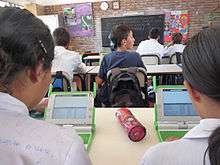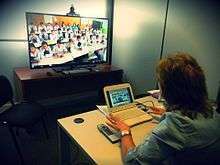Ceibal project
The Plan Ceibal is a Uruguayan initiative to implement the "1 to 1" model to introduce Information and Communication Technologies (ICT) in primary public education and is beginning with the expansion into secondary schools.
In four years Plan Ceibal delivered 450,000 laptops to all students and teachers in the primary education system and no-cost internet access throughout the country. As of 2009, results include increased self-esteem in students, improved motivation of students and teachers, and active participation by parents (94% approve of the Plan according to a national survey performed in 2009).
The success of Plan Ceibal is not only due to technological innovations, but also to achievements such as the creation of a training plan for teachers in primary education, the active inclusion of the society and teachers in the project and the successful design and implementation of a monitoring and evaluation model to measure the impact nationally that serves as a guide to define future actions in the Plan.
Ceibal Project emerged as a result of the digital gap that existed in Uruguay between the people who didn't have access to technology and to those who did. It was impelled during Tabaré Vazquez' term of office. Vasquez was the main proponent of this pioneer project; although it was inspired by Nicholas Negroponte's One Laptop per Child project. It raised three principal values: to distribute technology, to promote knowledge and to generate social equity.
The project was named "Ceibal" like the typical Uruguayan tree and flower called "ceibo", known in English as Cockspur coral tree. Ceibal also stands for "Conectividad Educativa de Informática Básica para el Aprendizaje en Línea" (Educational Connectivity/Basic Computing for Online Learning in English). The OLPC XO-1 computers used in the project are nicknamed "ceibalitas".
Goals
Ceibal Project tries to promote digital inclusion and decrease the digital gap that exists among the Uruguayans and between Uruguay and the rest of the world. However, this goal can be accomplished only if it is complemented by an educational plan for teachers, students and their families.The educational plan of Ceibal Project tries to create the technological resources, the teacher´s formation, the creation of suitable content and the social and familiar participation. Ceibal Project has strategic principles: equity of knowledge, equal opportunities for children and youth, the disposition of tools to learn, not only the knowledge that is given by the school, but also with the knowledge that the child can learn by him or herself.
General
- To improve the quality of education through the new technological system.
- Providing computers to every scholar and teacher of the public education, promote the same opportunities for all.
- To develop a culture based on collaboration between children, a child and teacher, teachers with each other, families and school.
- To promote a sense of criticism of technology on the pedagogical community.

Specific
- To promote the laptops as a useful tool in the schools.
- To offer the teachers a suitable technological and pedagogical formation of the new technologies.
- To produce educational resources, with the new technological tools.
- To inspire an innovational mind of the teachers.
- To assure a good development of the project by a supportive system and technological assistance.
- To involve the parents in the implementation of the project, not only in the schools, but also in the houses of the scholars.
- To promote the proportion of relevant information of all the people involved in the project, in order to improve it.
Phases
- To assure a good development of the project by a supportive system and technological assistance.
- To involve the parents in the implementation of the project, not only in the schools, but also in the houses of the scholars.
- To promote the proportion of relevant information of all the people involved in the project, in order to improve it.
Stages
- 2007
In April the presidential decree 144/007 signals the kick-off to provide a laptop to each primary school child and his teacher in every public school, as well as training for its use, and the promotion of educational proposals In May the pilot phase starts in Villa Cardal (Departamento de Florida), in which 150 students and their teachers participate. Villa Cardal is a town of 1,290 inhabitants and has just one school of 150 students. For this pilot phase laptops were donated by OLPC In October through an open tender, 100,000 OLPC laptops and 200 servers are awarded [1] By the end of 2007, all children and teachers from Florida have their laptops.
- 2008
The XO laptops a tool to appropriate technology" which took place in Colonia del Sacramento (Departamento de Colonia) on 5, 6, and 7 June 2008, in support of Ceibal Project
Before the end of the year more than 175,000 laptops are delivered, completing the whole country with the exception of parts of Canelones, Montevideo and its metropolitan area In September Ceibal Project and Teleton (Uruguay) signed an agreement which committed Ceibal to adapt its laptops to the needs of children with motor disabilities. In December the educational portal Plan Ceibal is createdn Plan Ceibal
- 2009
In April work is started with small companies in the interior of the country to provide descentralized technical support, within the framework of the Rayuela Project with the Inter-American Development Bank and DINAPYME In June on-line courses aimed at students in teacher education are launched in support of the National Administration of Public Education (ANEP) In the same month the first national monitoring and evaluation system is developed to work within the Ceibal Project [2] In August laptops are delivered to private schools In the same month laptops for the visually imparted are delivered In October the plan is fully covered including Canelones, Montevideo and its metropolitan area, all children and teachers in the country have their own laptops, with a coverage of more than 350,000 children and 16,000 teachers.
- 2010
In May private companies sponsor Ceibal classrooms in their companies as part of their social responsibility projects In November the pilot project in robotics is launched In October Ceibal Project starts its second phase, delivering laptops to students in secondary schools and to students in technical schools
- 2011
In March Ceibal Project starts a new and ambitious phase introducing laptops in nursery schools In August a television show called "¡Sabelo!" (Know it!) starts. It is a quiz show produced by Ceibal Project for students in secondary schools
- 2012
To celebrate the fifth anniversary of Ceibal Project a ceremony takes place at Villa Cardal, where it all started. VIDEO 5 años del Plan Ceibal Ceibal documentary for Austrian public television
- 2013
- On 2 October, president José Mujica delivered the 1,000,000 computer into an act at Escuela N° 177 (Yugoslavia 307) from Nuevo París, in Montevideo.[3]
Awards
In recognition to Ceibal Project´s achievements, it has received various national and international awards:
- Bronze Medal for National Quality and Commitment in Public Management due to Ceibal Project´s work in connectivity and connectivity support, National Institute of Quality INACAL, Uruguay, October 2012 INACAL, Uruguay, octubre 2012.[4]
- Frida Award in the category "Access", awarded by LANIC, IDRC and ISCO, Buenos Aires, Argentina October 2011 [5]
- First Prize in Development Capacity, awarded by UNDP-United Nations Development Programme for Development at the "Knowledge Fair", Marrakech, Morocco, March 2010 [6]
- Prize for Public Management, awarded by RED GEALC-Network of e-government Leaders of Latin America and the Caribbean "ExcelGob08", Montevideo, Uruguay, March 2009 [7]
- Special Mention for Ceibal´s Commitment with the Millennium Goals, awarded by RED GEALC-Network of e-government Leaders of Latin America and the Caribbean "ExcelGob08", Montevideo, Uruguay, March 2009
- Morosoli Golden Prize to Uruguayan Culture awarded by the Lolita Rubial Foundation. Minas, Uruguay, December 2013 [8]
English project

The project Ceibal en Inglés was conceived with the aim to solve problem of lack of specialized teachers of English in primary schools in the Uruguayan public system of education, with the objective of universalizing the right of every Uruguayan child to acquire a second language through a means that would ensure both quality and sustainability.[9][10]
Design
The project allows primary school children between fourth and sixth grades to have three 45 minute slots per week of English: one taught by a remote teacher, model of language and in charge of introducing and explaining the linguistic content corresponding to each week through his remote presence via videoconference equipment; and two forty-five-minute slots with the classroom teacher, who following the lesson plans sent to her every week, may review, accompany and guide her students in the learning of English. Lesson plans are associated to digital and non-digital materials, which contain songs, games, videos, etc., so that those contents already presented and explained by the remote teacher, may be revised, reviewed and recycled under the conduction of the classroom teacher. Coherence between remote lessons and face to face lessons is ensured by a half hour virtual coordination between the two teachers involved in the learning process, in which concerns, learning and teaching styles are discussed.
Each classroom teacher decides whether she wants to participate in this project, she does not need to know any English, but she receives an on-line course of English so that she can be one step ahead of her students and give them the necessary support.
Pilot phase and expansion
This project was piloted in twenty schools in the country between June and November 2012; five in the South (three in Maldonado and two in Pando, Canelones), and fifteen in the North between Salto and Paysandú, with a total of thirty seven groups. The group in the South started on June, 23rd, and the one in the North on August, 23rd.
The results of the pilot phase are highly encouraging, for this reason Ceibal en Inglés has expanded the project to one thousand groups in 2013. Plan Ceibal through an open international bid chose the British Council, a British organization of recorded experience in the teaching of English as a foreign language internationally, as its partner for this project.
On Thursday, 9 January 2014, the BBC Mundo website published an article entitled "Thousands of children in Uruguay learn English with distance teachers". The report highlights the work done by Plan Ceibal and explains that "this is the first time in the world where telepresence technology is used to teach English to large classes of primary school students in the state system", according to Paul Woods, representative of the British Council, the organization providing the teaching materials.
References
- ↑ Pliegos de la licitación Archived 29 September 2007 at the Wayback Machine.
- ↑ First national monitoring and evaluation system, 2009 Archived 22 May 2013 at the Wayback Machine.
- ↑ El Observador. "Se entregó la ceibalita un millón". Retrieved 2 October 2013.
- ↑ Montevideo.com.uy 01.11.12
- ↑ Montevideo.com 02.09.2011 El Plan Ceibal ganó el "Premio Frida" 2011
- ↑ 180.COM 16.03.10 Plan Ceibal: primer premio en Feria del Conocimiento de ONU
- ↑ Presidencia 06.03.09 PREMIOS "EXCEL GOB08" Archived 31 October 2013 at the Wayback Machine.
- ↑ [El Pais-Uruguay (3 December 2013) Morosoli for Plan Ceibal and Miguel Brechner.]
- ↑ Montevideo.com LANZAMIENTO DE CEIBAL EN INGLÉS
- ↑ Presidencia 16.08.2012 Archived 21 September 2013 at the Wayback Machine.
External links
- Official Education Web site
- Official Institucional Web site
- Project page on the British Council Uruguay site
- Miguel Brechner in TEDX – Plaza Cibeles
- OLPC Wiki about the project in Uruguay
- Miguel Brechner Frey of Plan CEIBAL speaks about the measurable results of the plan at TEDxBuenosAires, October 2010. Kids, parents and teachers from Escuela 5, Salto, Uruguay appear discussing the impact of the XO on their lives.